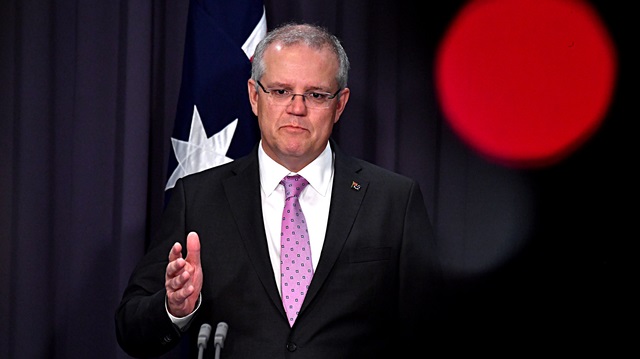
Australian Prime Minister Scott Morrison said on Wednesday a billion-dollar free trade agreement with Indonesia will be signed this year, despite Indonesian concern over an Australian proposal to recognise Jerusalem as the Israeli capital.
Morrison said on Tuesday he was open to Australia moving its mission from Tel Aviv to Jerusalem, as the United States did in May to the delight of Israel but to the fury of Palestinians.
Morrison's willingness to reverse decades of foreign policy and follow the U.S. lead alienated many of Australia's Asian neighbours that have close alliances with Palestinians.
It also drew condemnation from 13 Arab ambassadors in Australia who called the suggestion regrettable and asked Morrison to reconsider, or risk damaging Australian ties in the region.
Morrison, who faces a critical by-election on Saturday that will determine whether his government keeps its one-seat majority, said his government had been assured Indonesia would honour its commitment to the deal worth more than A$16 billion ($11.4 billion).
"There's been direct communication between myself and the president as well as between our foreign ministers and with the trade ministers," Morrison told reporters in Canberra, referring to Indonesia's President Joko Widodo.
"The Indonesian trade minister has made it very clear on the public record that is not an issue of concern to them," he said.
Indonesia is the world's biggest Muslim-majority country, where the Palestinian question is a sensitive issue and tens of thousands protested against Trump’s decision to move the U.S. embassy to Jerusalem.
Indonesian Foreign Minister Retno Marsudi, speaking at a news conference with Palestinian Foreign Minister Riyad al-Maliki in Jakarta on Tuesday, called on Australia to avoid any step that would threaten efforts to forge peace in the Middle East.
The trade agreement, which has been in the works for nearly a decade, offers Australia a chance to boost rural exports, which dominates two-way trade.
Indonesia is a major importer of wheat and beef and bought more than A$3 billion of Australian agricultural commodities in 2017, according to government data.
Fiona Simson, president of Australia's National Farmers Federation, which represents the rural sector, cautioned Morrison against any move that would threaten exports.
The Council of Arab Ambassadors said in a statement issued on its behalf by Egypt's envoy to Australia, said it was very worrying that Morrison would entertain the idea of shifting Australia's embassy.
"Any decision to recognise Jerusalem as Israel's capital or to relocate the Australian embassy would legitimise the status quo and affirm Israel’s claims to the entire city," it said.
The status of Jerusalem is one of the thorniest obstacles to a peace deal between Israel and the Palestinians. Israel regards all of the city, including the eastern sector that it annexed after the 1967 Middle East war, as its capital.
While raising concern among rural voters worried about exports, Morrison's potential policy shift could help his government retain its one- seat parliamentary majority.
Voters in the Sydney electorate of Wentworth will decide on Saturday who will replace former prime minister Malcolm Turnbull, who quit politics after he was ousted in a party revolt in August.
Wentworth is home to a large Jewish community. Census figures show 12.5 percent of people in Wentworth are Jewish, a larger proportion than anywhere else in Australia.
The candidate contesting the by-election for Morrison's Liberal party, Dave Sharma, is a former ambassador to Israel who was credited with the idea to relocate the embassy.












